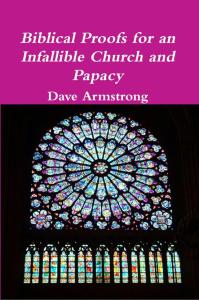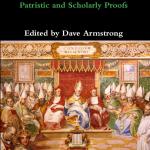[see book and purchase information]
Matthew 16:18 (RSV) And I tell you, you are Peter, and on this rock I will build my church, and the powers of death shall not prevail against it.
Catholics have solid exegetical and linguistic reasons (agreed to by many prominent Protestant exegetes) for why we believe Jesus was calling Peter himself the rock (not Peter’s faith or Christ Himself). Presently, however, I am dealing with one particular objection made to this view: the notion that Scripture elsewhere calls Jesus Christ a “Rock”; therefore (so the reasoning goes) Peter can’t possibly be called the same thing.
This simply isn’t true. The objection presupposes what I would argue is an unbiblical and hyper-rationalistic “either/or” outlook; whereas the Bible teaches a “both/and” point of view.
Here are some of the passages brought up in order to set forth such a view:
Matthew 21:42 Jesus said to them, “Have you never read in the scriptures: ‘The very stone which the builders rejected has become the head of the corner; this was the Lord’s doing, and it is marvelous in our eyes’?” (cf. Mk 12:10; Lk 20:17-18)
Acts 4:11 as it is written, “Behold, I am laying in Zion a stone that will make men stumble, a rock that will make them fall; and he who believes in him will not be put to shame.”
Romans 9:32-33 Why? Because they did not pursue it through faith, but as if it were based on works. They have stumbled over the stumbling stone, [33] as it is written, “Behold, I am laying in Zion a stone that will make men stumble, a rock that will make them fall; and he who believes in him will not be put to shame.”
1 Corinthians 10:4 . . . For they drank from the supernatural Rock which followed them, and the Rock was Christ.
1 Peter 2:4, 6-8 Come to him, to that living stone, rejected by men but in God’s sight chosen and precious; . . . [6] For it stands in scripture: “Behold, I am laying in Zion a stone, a cornerstone chosen and precious, and he who believes in him will not be put to shame.” [7] To you therefore who believe, he is precious, but for those who do not believe, “The very stone which the builders rejected has become the head of the corner,” [8] and “A stone that will make men stumble, a rock that will make them fall”; for they stumble because they disobey the word, as they were destined to do.
Now, is this intended to exclude anyone else being called a rock or a stone? No. In Scripture, creatures are often called in an essentially lesser sense or degree, things which God is called. There can be such a thing as a Big Rock (God) and a small rock or stone (men or a man). In fact, this is explicit biblical teaching. Note that in the passage from 1 Peter, above, I left out a verse. Here it is:
1 Peter 2:5 and like living stones be yourselves built into a spiritual house, to be a holy priesthood, to offer spiritual sacrifices acceptable to God through Jesus Christ.
The “spiritual house” is likely referring to the Church. Jesus, in the larger passage, was called a “living stone” a “cornerstone” and “the head of the corner.” Yet we Christians are also called “living stones” in the same passage. Thus, there is no “either/or” pattern here. Both things can be true. If there can be little stones along with God as the Big Rock, then there can also conceivably be the “chief” of these secondary stones, and that would be Peter, based on the data of Matthew 16:18. And there’s more, too:
Ephesians 2:19-22 So then you are no longer strangers and sojourners, but you are fellow citizens with the saints and members of the household of God, [20] built upon the foundation of the apostles and prophets, Christ Jesus himself being the cornerstone, [21] in whom the whole structure is joined together and grows into a holy temple in the Lord; [22] in whom you also are built into it for a dwelling place of God in the Spirit.
This is again referring to the Church (2:19), which is “built upon the foundation of the apostles and prophets” (2:20). Thus we have precisely the same notion that Catholics contend is expressed in Matthew 16:18: there is a secondary / “co-worker” sense in which the Church is built upon men. Here it is the twelve apostles and prophets as well. In Matthew it’s Peter, as the leader and foremost of the apostles. And then in the next verse we have the “Big Rock”: “Christ Jesus himself being the cornerstone”. So there is no false dichotomy. One is not in opposition to the other. Another passage teaches the same thing (without mentioning Jesus in this particular instance):
Revelation 21:14 And the wall of the city had twelve foundations, and on them the twelve names of the twelve apostles of the Lamb.
This sort of typology is, as I stated, common in Scripture. Catholic apologist Patrick Madrid noted:
Jesus shares his other unique roles in lesser ways with Christians.
1) Jesus is the Creator of all things (John 1:1-3, Col 1:16-17, Heb 1:1-2), yet when it comes to creating human life Jesus shares this role with men and women, mediating his creatorship through us via sexual intercourse . . . [making] his role as Creator dependent in a way on human action.
2) Jesus is the shepherd of his flock the Church (Jn 10:16), yet he shares his shepherdhood in a subordinate way with others, beginning with Peter (Jn 21:15-17) and extending it later to others (Eph 4:11) . . . Jesus says he’s the only shepherd (Jn 10:11-16), yet this seemingly exclusive statement doesn’t conflict with him making Peter shepherd . . . or with his calling others to be shepherds as well (Eph 4:11). Peter emphasizes that Jesus shares his role as shepherd with others by calling Jesus the chief shepherd . . . (1 Pet 5:4). Note also that the Greek construction of John 10:16 . . . is the same as 1 Timothy 2:5 (. . . one mediator . . .). The apostles and their successors the bishops, are truly shepherds also.
3) Jesus is the high priest of the New Covenant . . . (Heb 3:1, 4:14-15, 5:5-10, 7:15-26, 8:1, 9:11). But the Bible also says Christians are called to share in Christ’s priesthood (1 Pet 2:5-9; Rev 1:6, 5:10, 20:6).
4) Jesus is the supreme judge (Jn 5:27, 9:39; Rom 14:10; 2 Cor 5:10; 2 Tim 4:1), yet Christians are called to share in Christ’s judgeship. They will be judges in heaven, even judging the angels (Matt 19:28; Lk 22:30; 1 Cor 6:2-3; Rev 20:4).
5) Jesus is the sovereign king of the universe (Mk 15:32; 1 Tim 6:15; Rev 15:3, 17:14, 19:16), but he shares his kingship with all Christians, who in heaven will wear crowns, sit on thrones, and reign as kings alongside Jesus – but always subordinate to him . . . (see also Matt 19:23; Lk 22:30; Rev 1:6, 3:21, 5:10).
6) Jesus forgives our sins and reconciles us to the Father (2 Cor 5:18-21), but he calls us to share in various ways in his ministry of forgiveness and reconciliation (Matt 9:5-8, 18:18; Jn 20:21-2; Acts 2:38; 2 Cor 5:18-20; James 5:14-15) . . .
Each Christian is called to share in these roles in subordinate ways. The principle of sharing in Christ’s roles extends, in the form of intercessory prayer, to Christ’s mediatorship as well.” (“Any Friend of God’s is a Friend of Mine”, This Rock, Sep. 1992, 7-13; quote from 10-12; numbers added)
I can think of at least two other things off the top of my head. We are “co-workers” with God (“we are God’s fellow workers”: 1 Cor 3:9; “Working together with him”: 2 Cor 6:1; ” the Lord worked with them”: Mk 16:20; “I worked harder than any of them, though it was not I, but the grace of God which is with me”: 1 Cor 15:10; “work out your own salvation with fear and trembling; for God is at work in you”: Phil 2:12-13).
And God even shares His glory with us:
John 17:22 The glory which thou hast given me I have given to them, . . .
Romans 5:2 Through him we have obtained access to this grace in which we stand, and we rejoice in our hope of sharing the glory of God.
Romans 9:23 in order to make known the riches of his glory for the vessels of mercy, which he has prepared beforehand for glory,
2 Corinthians 3:18 And we all, with unveiled face, beholding the glory of the Lord, are being changed into his likeness from one degree of glory to another; . . .
1 Thessalonians 2:12 to lead a life worthy of God, who calls you into his own kingdom and glory.
2 Thessalonians 2:14 To this he called you through our gospel, so that you may obtain the glory of our Lord Jesus Christ.
1 Peter 4:14 If you are reproached for the name of Christ, you are blessed, because the spirit of glory and of God rests upon you.
1 Peter 5:1 So I exhort the elders among you, as a fellow elder and a witness of the sufferings of Christ as well as a partaker in the glory that is to be revealed. (cf. 5:4)
2 Peter 1:3-4 His divine power has granted to us all things that pertain to life and godliness, through the knowledge of him who called us to his own glory and excellence, [4] by which he has granted to us his precious and very great promises, that through these you may escape from the corruption that is in the world because of passion, and become partakers of the divine nature.
Therefore, would Jesus call Peter the “Rock” upon whom He would build His Church? Yes! No problem at all! There is no prior, presuppositional scriptural difficulty or improbability in that, and we have additional compelling exegetical and linguistic reasons, too, for believing it.
***
Practical Matters: Perhaps some of my 4,000+ free online articles (the most comprehensive “one-stop” Catholic apologetics site) or fifty books have helped you (by God’s grace) to decide to become Catholic or to return to the Church, or better understand some doctrines and why we believe them.
Or you may believe my work is worthy to support for the purpose of apologetics and evangelism in general. If so, please seriously consider a much-needed financial contribution. I’m always in need of more funds: especially monthly support. “The laborer is worthy of his wages” (1 Tim 5:18, NKJV). 1 December 2021 was my 20th anniversary as a full-time Catholic apologist, and February 2022 marked the 25th anniversary of my blog.
PayPal donations are the easiest: just send to my email address: [email protected]. You’ll see the term “Catholic Used Book Service”, which is my old side-business. To learn about the different methods of contributing, including 100% tax deduction, etc., see my page: About Catholic Apologist Dave Armstrong / Donation Information. Thanks a million from the bottom of my heart!
***
Summary: The usual (but not universal) Protestant answer to the question: Can Christ & Peter Both be “Rocks”? is “no.” I show, however, how it is altogether biblically plausible.














